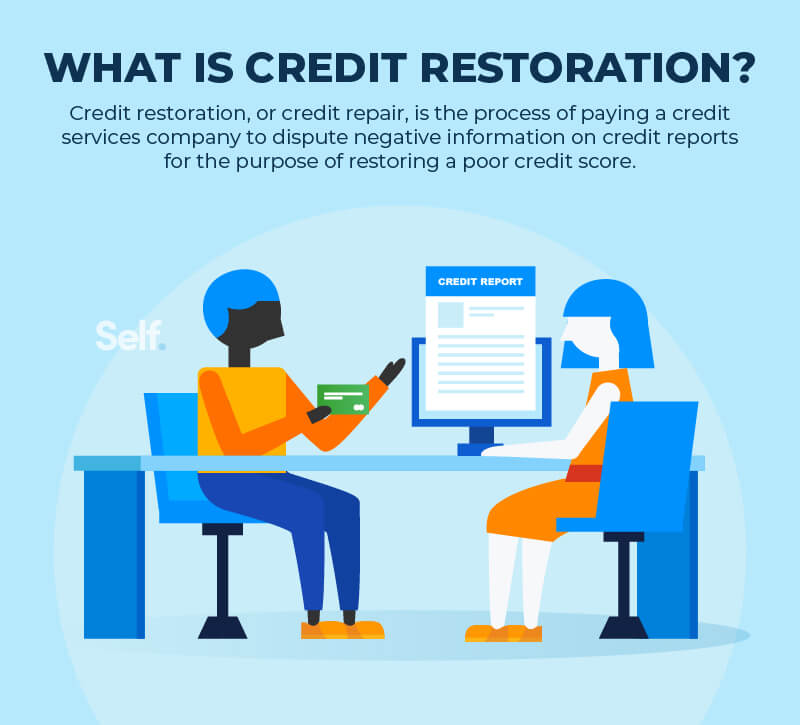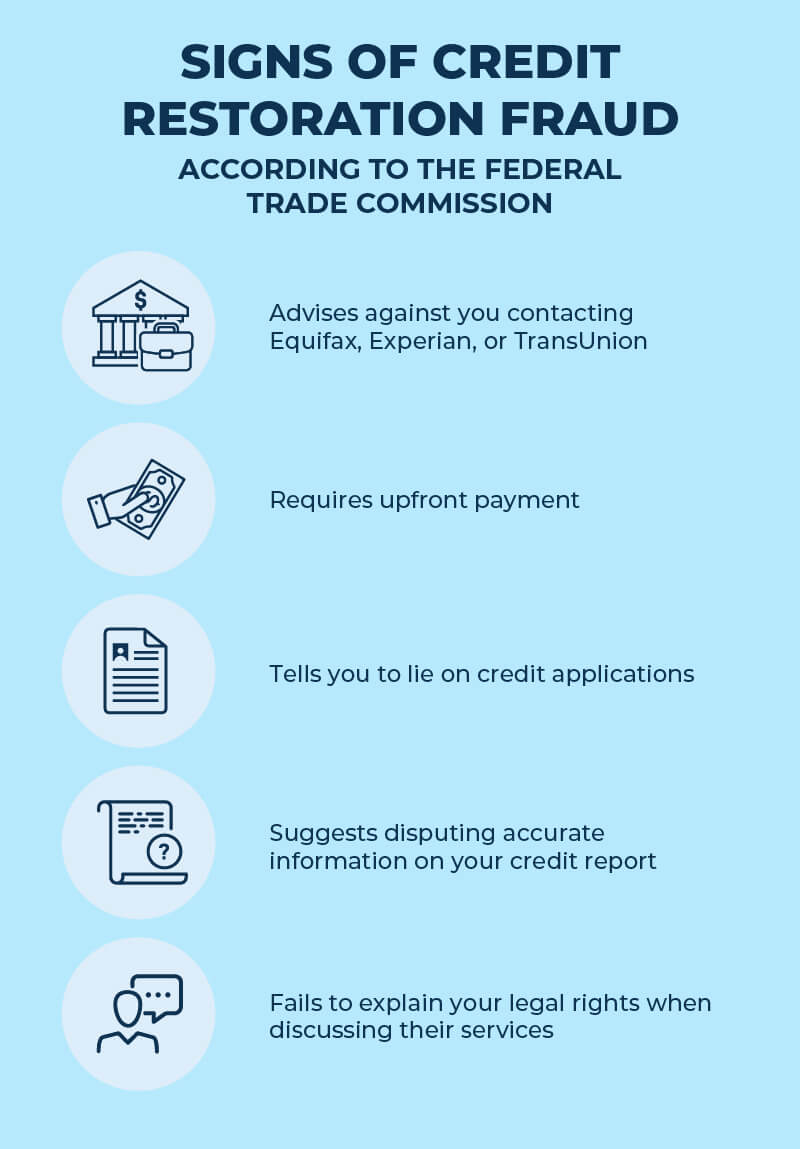What Is Credit Restoration and Is It Worth It?
Published on: 10/02/2022
Credit restoration, or credit repair, helps fix errors on your credit report to improve your credit score. If your credit needs fixing, you may wonder how credit repair works, if you should pay a fee to get help, and how to find a legitimate credit restoration company. This article helps you understand credit restoration, how it can improve your credit score, how to evaluate credit repair companies as well as how to repair your credit for free.
What is credit restoration?
Credit restoration is the process in which you dispute inaccurate information in your credit history. When you want a better credit score, credit restoration may help to remove incorrect information that looks like bad credit history on your credit report. It may improve your FICO® score and reflect a more positive credit history to potential lenders.

While you can’t do much about legitimate negative items on your credit report, the Fair Credit Reporting Act (FCRA) gives you the right to dispute incomplete or incorrect (including outdated) information. Consumer reporting agencies must fix or remove inaccurate, incomplete or unconfirmed information, generally within 30 days.[1]
Are credit restoration and credit repair the same thing?
Yes, the terms credit restoration and credit repair refer to the same process. Both usually involve removing inaccurate negative credit items from your credit history — for a fee — to improve your credit score and generate a more positive credit history.
What do legitimate credit restoration companies offer?
Legitimate credit restoration companies work on your behalf to remove errors from your credit report. They communicate with the three major credit bureaus (Experian, Equifax and TransUnion) or financial companies (such as banks and collection agencies) to dispute only incorrect, negative items — not negative items that happen to be correct.
A legitimate credit repair service offers
- To remove only inaccurate information from your credit report
- To charge you only after they’ve completed the services for you[2]
Typically, legitimate services charge you in one of two ways:
- For each item they succeed in deleting from your credit report.
- For a monthly payment, charging you for their services over the previous 30 days.[3]
Signs of a credit restoration scam

Although some credit repair companies provide legitimate services, others target vulnerable customers with credit restoration scams. To avoid falling for a credit repair scam, be on the lookout for the following red flags:
- Requiring payment upfront: Under the Credit Repair Organizations Act (CROA), credit repair companies cannot charge you until after they complete the work they promised.[4]
- Making promises they can’t keep: If companies offer you a quick fix, guarantee results like an A+ credit rating or tell you they can remove legitimate negative items from your credit report, they are making promises that are too good to be true — and possibly fraudulent as well.[4]
- Advising you not to contact the three major credit bureaus (Experian, Equifax and TransUnion) directly: Under the FCRA, you have the right to request credit reports and to dispute errors with the credit bureaus yourself.[5]
- Suggesting that you misrepresent information: Reputable credit restoration services will not ask you to dispute accurate credit information, give false information on credit applications or get a new credit report by applying for an Employer Identification Number instead of using your Social Security number.[4]
- Not answering questions or explaining their services: An honest company should be able to describe the specific credit repair services they offer, tell you about their pricing and explain your legal rights.[4]
Can I dispute credit report errors myself?
No legitimate credit repair company can do anything for you that you can’t do for yourself for free. So if you don’t want to pay a fee to repair your credit, you can follow the steps below to fix errors in your credit report yourself for free.
- Request your free credit report from annualcreditreport.com and look for any discrepancies or potential errors in your credit history that could be damaging your credit score. You have the right to receive a free credit report once a year under the FCRA.
- Identify errors on your credit report. Common reporting errors include transposed or incorrect identification numbers, balance errors, duplicate accounts and incorrect reports of late payments. You may also find evidence of identity theft and fraud.
- File a dispute with the three major credit reporting agencies: Equifax, Experian and TransUnion if you find any legitimate errors. You can initiate the dispute by phone, mail or online.
- Wait to hear back from the credit bureaus. Credit bureaus have 30 days to complete the dispute process, but it won’t always take that long. If the bureaus conclude that the information was inaccurate, they update your credit report within 30 days. The information remains on your credit report if the credit bureaus find that the information is accurate. You can refile your dispute with the credit bureaus or try to resolve the dispute by contacting the creditor directly if you still believe the information is inaccurate.[6]
Common credit report errors
When reviewing your credit report, you may find information that is inaccurate or incomplete — or not even about you. Keep an eye out for the following common credit report errors:
- Identity errors: Incorrect or mispelled name, address or phone number
- Incorrect account status: Closed accounts reported as open; same debt listed more than once; accounts incorrectly reported as late or delinquent (or with incorrect late payment dates); credit card accounts improperly listing you as the owner rather than an authorized user
- Inaccurate balances: Accounts with incorrect current balances or incorrect credit limits
- Data management mistakes: Reinsertion of incorrect information after it was deleted or corrected; accounts appearing multiple times with different lenders or creditors listed[7]
Should I use a legitimate credit restoration company?
Legitimate credit restoration companies can indeed help you repair your credit. If you don’t feel comfortable tackling the credit repair process on your own, it may be worth hiring a credit restoration service.
Before hiring anyone, familiarize yourself with credit repair scams and research businesses on the Better Business Bureau website at BBB.org to see if any complaints have been made. Select a credit repair company that works within the law to help you clear inaccurate information from your credit reports to help you build a healthier credit history.
But remember: You don’t actually need a credit restoration company to clean up your credit. You can do so yourself, and save money in the process.
Disclosure: FICO is a registered trademark of Fair Isaac Corporation in the United States and other countries.
Sources
- Consumer Financial Protection Bureau. “A Summary of Your Rights Under the Fair Credit Reporting Act,” https://files.consumerfinance.gov/f/documents/bcfp_consumer-rights-summary_2018-09.pdf. Accessed on May 18, 2022.
- USC. “Credit Repair Organizations,” https://uscode.house.gov/view.xhtml?req=granuleid%3AUSC-prelim-title15-chapter41-subchapterII. Accessed on May 24, 2022.
- CNBC.com. “Credit repair services can dispute credit report errors for you, but beware of scams and high fees,” https://www.cnbc.com/select/how-do-credit-repair-services-work/. Accessed on May 17, 2022.
- Consumer Financial Protection Bureau. “CONSUMER ADVISORY: Don’t Be Misled by Companies Offering Paid Credit Repair Services,” https://files.consumerfinance.gov/f/documents/092016_cfpb_ConsumerAdvisory.pdf. Accessed on May 17, 2022.
- Equifax. “Avoiding 'Credit Repair' Scams,” https://www.equifax.com/personal/education/debt-management/all-about-credit-repair-companies/. Accessed on May 17, 2022.
- Equifax. “A Guide to Credit Report Disputes,” https://www.equifax.com/personal/education/credit/report/how-to-dispute-credit-report-information/. Accessed May 23, 2022.
- Consumer Financial Protection Bureau. “What are common credit report errors that I should look for on my credit report?” https://www.consumerfinance.gov/ask-cfpb/what-are-common-credit-report-errors-that-i-should-look-for-on-my-credit-report. Accessed on May 18, 2022.
About the author
Ana Gonzalez-Ribeiro, MBA, AFC® is an Accredited Financial Counselor® and a Bilingual Personal Finance Writer and Educator dedicated to helping populations that need financial literacy and counseling. Her informative articles have been published in various news outlets and websites including Huffington Post, Fidelity, Fox Business News, MSN and Yahoo Finance. She also founded the personal financial and motivational site www.AcetheJourney.com and translated into Spanish the book, Financial Advice for Blue Collar America by Kathryn B. Hauer, CFP. Ana teaches Spanish or English personal finance courses on behalf of the W!SE (Working In Support of Education) program has taught workshops for nonprofits in NYC.
Editorial policy
Our goal at Self is to provide readers with current and unbiased information on credit, financial health, and related topics. This content is based on research and other related articles from trusted sources. All content at Self is written by experienced contributors in the finance industry and reviewed by an accredited person(s).
